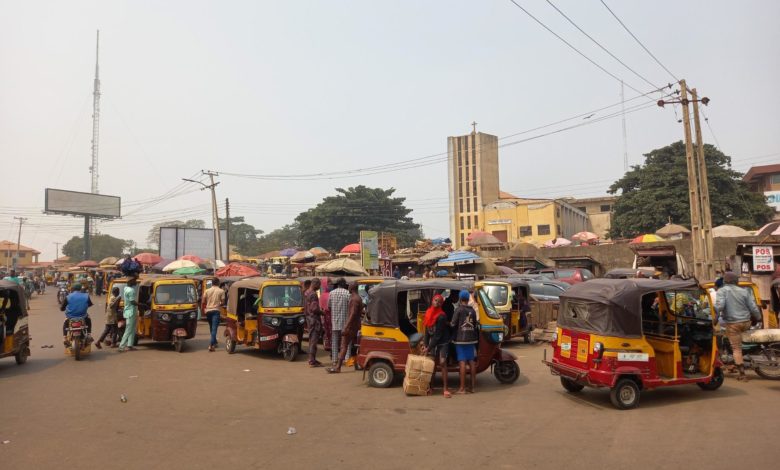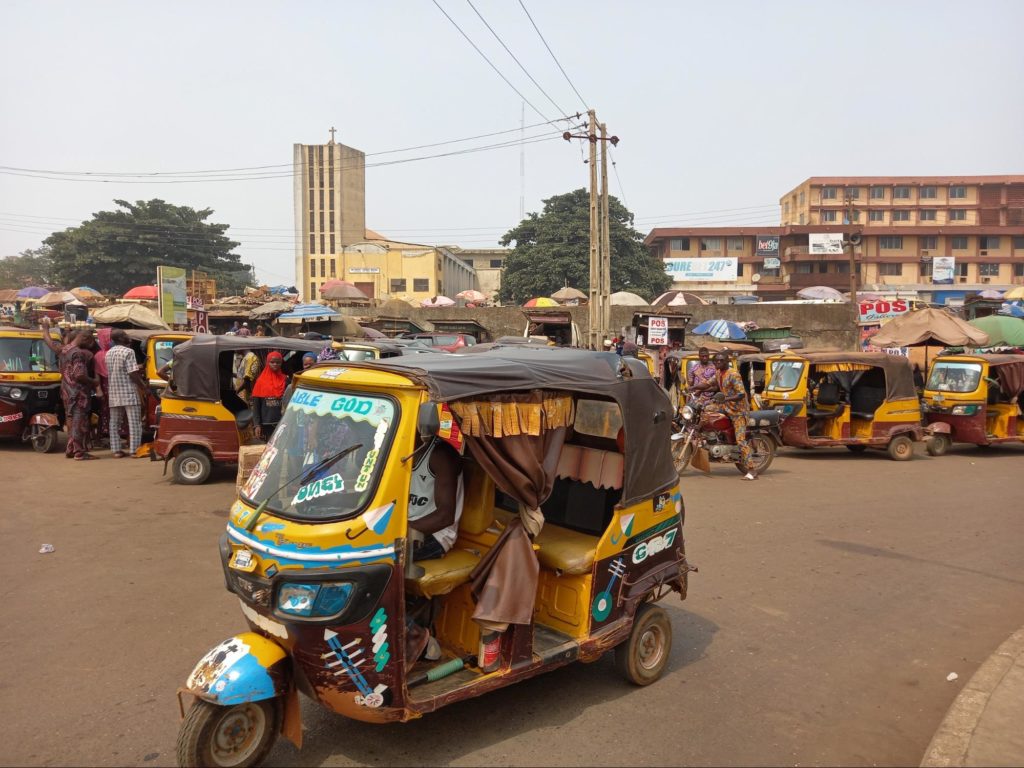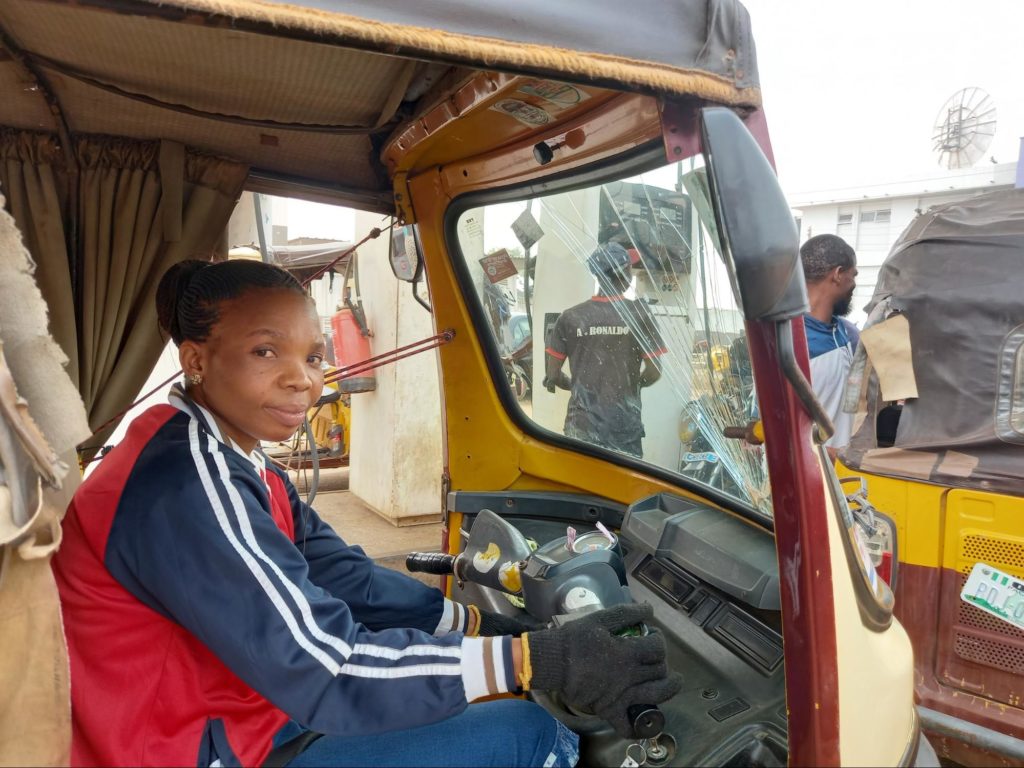Behind The Wheel, Nigerian Women Battle Discrimination, Economy Suffers

On the eve of the New Year in 2019, Oyeniyi Iyabo, a tricycle driver in Ibadan, the capital of Oyo State, had no money with her when she stepped out for the day’s work very early in the morning. Few minutes into her first trip of the day, a police officer stopped her and demanded a ‘N100 bribe’.
Since she had no cash, she implored the police officer to wait till when she made a return trip along the same route but her pleas fell on deaf ears.
“They started abusing me, saying stuff like they were not responsible for my current predicament or what led me to become a female tricycle driver,” Iyabo told HumAngle.
As tears dripped down her face, she began to exchange words with the police officers but their words like a double-edged spear had opened up a past she thought she had left behind.
“When I got home that day, I started weeping profusely, again. I remembered that if not for my husband’s untimely death, I won’t be a tricycle rider because in my hometown I used to have a shop and all the things I needed.”
Iyabo was nursing her first child and heavily pregnant when her husband died. In 2015, a few months after her loss, her first child fell sick. As his situation deteriorated, she gathered all the money she could and took him to the University College Hospital, Ibadan, for treatment.
A few months later, she had expended all the money she had on her son’s treatment but his situation had not improved.
One afternoon, she was trekking by the roadside, thinking of a way out of her ordeal when she saw a woman drive past in a commercial tricycle. She stopped her and said, “I am interested in this job.”

Five years later, that job is still her primary source of income through which she bears the responsibility of being a single mother of two.
However, as she steps out of her home daily, she must be prepared to face off extra challenges female tricycle drivers, like other women in Nigeria’s informal economy, have to grapple with.
***
In a digital report released by CFR Women and Foreign Policy Program, it predicted that Nigeria’s Gross Domestic Product (GDP) could grow by 23 per cent by 2025 “if women participated in the economy to the same extent as men”.
This prediction evidently called for a shift in the level of participation of Nigerian women in the labour force.
The International Monetary Fund (IMF) also argues that by strengthening gender equality in Nigeria, especially in workplaces, it will be an economic game-changer that could lead to greater stability. IMF noted that for every four men in Nigeria’s labour market, three women participated.
However, aside from the fact that Nigeria still accommodates laws that have refused to enforce non-discrimination in workplaces and it ranks 87th on the Women and Foreign Policy Program’s Women’s Workplace Equality Index, women who defy the odds to engage in jobs that are culturally presumed to be unfit for them face various discrimination.
Iyabo noted that women in her field of work are open to an unending list of discrimination from police officers, transport union workers, and passengers who view their gender as a weakness and an opportunity to maltreat them.

“As for the union guys, if we don’t give them money they will start removing the carpet in our tricycles. The union guys are not even interested in whether you are a male or female. Even when your passengers plead on your behalf, they will just shout on you to give them their money,” Iyabo said.
“There is also the challenge with some passengers who will attempt to frustrate you. Some passengers will deliberately do things they know they can’t do for a male driver.
“For example, there was a day I carried a woman from Gate (a community in Ibadan) and I told her that her fare is N70, she said she will pay N50 but I told her no one will collect such a little amount from her. The next thing she did was that she started shouting that we female drivers are not good people.”
Adelani Funke was at a mechanic shop preparing to hit the road again when this reporter approached her. “I started driving tricycle five years ago,” she said as she slightly rested her body on her tricycle.
A graduate of Business Education from Emmanuel Alayande College of Education, Adelani echoed the grievances of other tricycle drivers who spoke with HumAngle. Sharing her experiences, she paints an image of the environment they work as an unsafe one.
According to her, the moment some passengers discover that the driver is a woman, they will deliberately try to frustrate her. If the driver does not act with confidence, she might get robbed or cheated.
To avoid this, she noted that female drivers carry a different personality at their place of work because they must always be on guard and at alert.
Adelani further said police officers were another problem they faced on a daily basis as the failure to pay bribes of N50 or N100 was “an invitation to trouble”.
Gender Advocate and Development Expert, Busola Ajibola, says discrimination exists in workplaces on the basis of gender in the country because people are yet to fully appreciate the amount of economic and social development attainable if women are empowered and supported to express all of their skills and capacities without restraint.
She noted that women, like men, have the skills and potentials to bring value to any table. “If we have women as pilots, why can we not have them as drivers – of trucks, buses, and tricycles?” she asked rhetorically.
“The worse effect of such discrimination is that it predisposes women to inequality and other social crisis that come with it – poverty, violence, lack of fulfilment and so on. And the women in question are not the only ones that suffer the consequences of such discrimination, the family as a unit and the society also suffer poverty as a result.
“A woman who does not thrive economically can neither contribute to the economy of her family nor thrive emotionally,” she stressed.
To put an end to these discriminations, Ajibola called for more sensitisation in the area of gender equality and the inclusion of women in all spheres of participation.
“Driving, for example, is not a skill peculiar to men and if women do it at private levels, they can as well make money from it.”
Support Our Journalism
There are millions of ordinary people affected by conflict in Africa whose stories are missing in the mainstream media. HumAngle is determined to tell those challenging and under-reported stories, hoping that the people impacted by these conflicts will find the safety and security they deserve.
To ensure that we continue to provide public service coverage, we have a small favour to ask you. We want you to be part of our journalistic endeavour by contributing a token to us.
Your donation will further promote a robust, free, and independent media.
Donate HereStay Closer To The Stories That Matter




